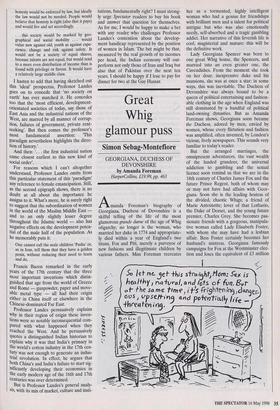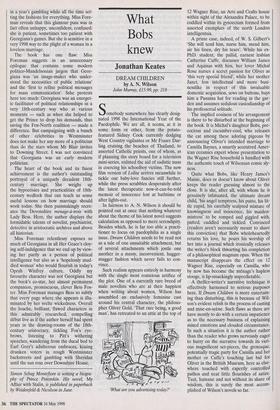Great Whig glamour puss
Simon Sebag-Montefiore
GEORGIANA, DUCHESS OF DEVONSHIRE by Amanda Foreman HaiperCollins, £19.99, pp. 463 Amanda Foreman's biography of Georgiana, Duchess of Devonshire is a skilful telling of the life of the most glamorous grande dame of the age of Whig oligarchy; no longer is the woman, who married her duke in 1774 and appropriate- ly died within a year of England's two titans, Fox and Pitt, merely a purveyor of new fashions and illegitimate children by various fathers. Miss Foreman recreates her as a tormented, highly intelligent woman who had a genius for friendships with brilliant men and a talent for political intrigue but who was also emotionally needy, self-absorbed and a tragic gambling addict. Her narrative of this feverish life is cool, magisterial and mature: this will be the definitive work.
Lady Georgiana Spencer was born to one great Whig house, the Spencers, and married into an even greater one, the Cavendishes. From the moment she took on her dour, inexpressive duke and his mansions, she was at once a star: in some ways, this was inevitable. The Duchess of Devonshire was always bound to be a queen of political entertaining and fashion- able clothing in the age when England was still dominated by a handful of political land-owning dynasties. But as Amanda Foreman shows, Georgiana soon became the Duchess, adored by men, envied by women, whose every flirtation and fashion was amplified, often invented, by London's vicious, lively newspapers. This sounds very familiar to today's reader.
But the arranged marriages, the omnipresent adventurers, the vast wealth of the landed grandees, the universal addiction to gambling and the sexual licence soon remind us that we are in the 18th century of Charles James Fox and the future Prince Regent, both of whom may or may not have had affairs with Gear- giana. Soon she is the leading hostess of the divided, chaotic Whigs; a friend of Marie Antoinette; lover of that Lothario, the Duke of Dorset, and the young future premier, Charles Grey. She becomes pas- sionate friends with a gorgeous, manipula- tive woman called Lady Elisabeth Foster, with whom she may have had a lesbian affair. Bess Foster certainly becomes her husband's mistress. Georgiana famously campaigns for Fox at the Westminster elec- tion and loses the equivalent of £3 million in a year's gambling while all the time set- ting the fashions for everything. Miss Fore- man reveals that this glamour puss was in fact often unhappy, unconfident, confused: she is patient, sometimes too patient with Georgiana's games. But she is sensitive in a very 1998 way to the plight of a woman in a loveless marriage.
The book has one flaw: Miss Foreman suggests in an unnecessary epilogue that contains some modem politico-Mandelsonian jargon that Geor- giana was 'an image-maker who under- stood the necessities of public relations' and the 'first to refine political messages for mass communication'. Sshe protests here too much: Georgiana was an energet- ic facilitator of political relationships in a very 18th-century way who at various moments — such as when she helped to get the Prince to drop his demands, thus saving the Fox-North coalition — made a difference. But campaigning with a bunch of other celebrities in Westminster does not make her any more of a politician than do the stars whom Mr Blair invites to Downing Street. I was not convinced that Georgiana was an early modem politician.
The heart of the book and its finest achievement is the author's outstanding portrayal of a uniquely decadent 18th- century marriage. She weighs up the hypocrisies and practicalities of 18th- century wedlock that can teach us some useful lessons on how marriage should work today. She then painstakingly recre- ates the Devonshire menage-ti-trois with Lady Bess. Here, the author displays the formidable talents of novelist, psychiatrist, detective in aristocratic archives and above all historian.
Miss Foreman relentlessy exposes so much of Georgiana in all Her Grace's cloy- ing self-indulgence that we end up by view- ing her partly as a person of political intelligence but also as a 'hopelessly mud- dled woman' who would flourish in today's Oprah Winfrey culture. Oddly my favourite character was not Georgiana but the book's co-star, her almost permanent companion, promiscuous, clever Bess Fos- ter. Miss Foreman manages Bess so subtly that every page where she appears is illu- minated by her svelte wickedness. Overall the louche, brilliant, flawed characters in this admirably researched, compelling debut live as if the author herself had spent years in the drawing-rooms of the 18th- century aristocracy, tickling Fox's eye- brows, listening to Pitt's withering speeches, wandering from the ducal bed to Earl Grey's adulterous embraces, kissing drunken voters in rough Westminster backstreets and gambling with Sheridan until the sun rose over Downshire House.
Simon Sebag Montefiore is writing a biogra- phy of Prince Potemkin. His novel, My Affair with Stalin, is published in paperback by Weidenfeld & Nicolson in June.



























































 Previous page
Previous page